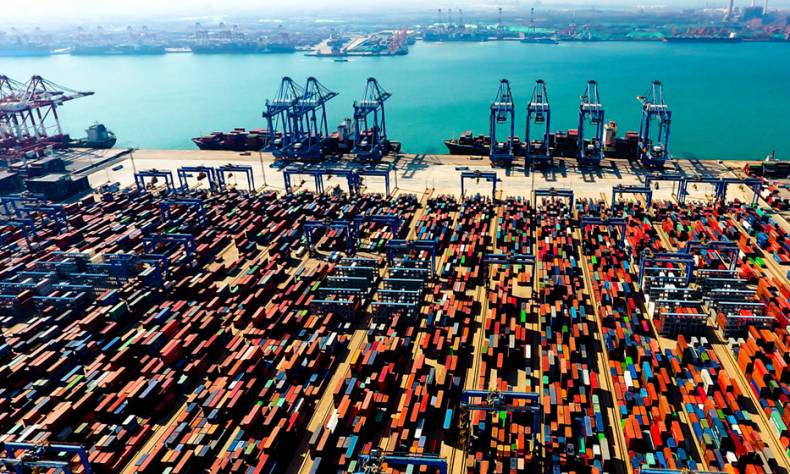
Forging A Just and Equitable Trading Structure
China’s entry into the international trading system, culminating in 2001 in its accession to the World Trade Organization, was neither quick nor easy.
By William Jones
China’s Entry into the International Trading System Has Been Impeded by the U.S.
China’s entry into the international trading system, culminating in 2001 in its accession to the World Trade Organization, was neither quick nor easy. While the policy of “reform and opening up” was launched forty years ago in 1978, the road to 2001 has been arduous and contained many pitfalls. Although most of the world was happy to see this 1978 shift in policy, the suspicions and anxieties stemming from the Cold War were not easily overcome.
Not least of all in the United States, which had initiated the first contacts with China in the early 1970s, largely as a wedge against a more powerful Soviet Union. But by the mid-1990s, China was beginning to find ways to effectively engage with the international trading system. The biggest obstacle was the United States. Under the 1974 Jackson-Vanik Amendment, countries which did not allow their people the right to emigrate were denied most-favored-nation (MFN) status. From 1980, after the establishment of official relations between the U.S. and the People’s Republic of China, a waiver would be issued each year to allow free trade to occur with China, and each year such a waiver created an opportunity for the anti-China lobby, also a remnant of the Cold War, to raise a furor over human rights in China or some other contentious issue.
China Strives to Meet the Tough Trading Requirements and Be An Active Participant
This situation was obviously untenable in the long run and as from January 1, 2002, China was granted Permanent Normal Trade Relations status, a new name for previous MFN status, after it joined WTO. But the agreement with China required the implementation of major changes in the Chinese economy, changes which often involved some hard choices – eliminating some tariffs, opening up markets for foreign investment, eliminating subsidies and import quotas. But China was intent on meeting these requirements in order to enter the international system, which it felt would be to the long-term benefit of the country and its people. And they were correct in that assumption.
Nevertheless, it was a system that was not of their choosing, nor was it completely equitable and fair. And many countries, particularly developing countries, have still to feel the benefits of this multilateral trading system. But China was intent on becoming an active part of the system and intent on contributing to making the system more just and more equitable. The initiation of the Belt and Road project and the creation of new financial institutions like the AIIB and the BRICS Development Bank have been steps in that direction. But the fact of the matter is that a functioning international system of trade is absolutely essential today when the cup of coffee you drink in the morning in New York (or the tea you drink in Shanghai) is ultimately dependent on a world-wide division of labor. Any attempt to forego such a system would only result in chaos.
The U.S. Needs to Contribute to A Just Trading System and Win-win Globalization
The tariffs now threatened by the Trump Administration would, of course, be deemed impermissible under WTO rules. For this reason, the U.S. has cited “national security concerns” for the tariffs, thus bypassing WTO jurisdiction. The flimsiness of the pretext is readily apparent to all, as these “tariffs” have also been imposed on nations directly allied to the United States as well. But the principle of “just” and “equitable” means that what is good for the goose is also good for the gander. That is, the United States, which was perhaps more instrumental than any other nation – certainly more than China – in creating the present trade organization cannot simply say “We don’t like it, so we will ignore it.”
If the United States feels that the trading system is infringing on their rights, then it must do as China had to do in becoming a member – work to change the system for the better. And it can only be seen as hypocrisy when the U.S. tries to circumvent the WTO through its “national security gambit”, and then tries to take the case to the WTO when China imposes counter-tariffs on the U.S. to counter the U.S. tariffs imposed on it.
No one thinks this is a perfect system, but some system of international order in the field of trade, as in the field of security, is absolutely essential if we are to avoid returning to the dangerous principle of “might makes right”. If you want to change the system and make it more equitable and “fair’, please do. China would no doubt support positive changes of that nature, and much of what they have accomplished through their new international programs has significantly increased the “fairness” of the economic system, particularly for those most affected by the system’s injustice. Ironically, in a sense, China, which for many years had been isolated from the global system, has become the primary spokesman for globalization, but it is a globalization that is a win-win for all participants, rather than a “globalization” where one country, or a few countries together, set the rules, and everyone else must follow. This is what Franklin Roosevelt was striving for when he put forward his post-war vision of international relations, a vision that was unfortunately cut short by his untimely death.
William Jones, is the Washington Bureau Chief for the Executive Intelligence Review, and Non-resident Senior Fellow of Chongyang Institute for Financial Studies, Renmin University of China.
The article reflects the author’s opinion only, not necessarily the view of China Focus’.
 Facebook
Facebook
 Twitter
Twitter
 Linkedin
Linkedin
 Google +
Google +










